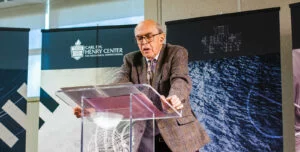Along with Abraham Kuyper (1837–1920), Herman Bavinck (1854–1921) provided the intellectual foundation for the revival of nineteenth and twentieth-century Dutch Reformed theology and scholarship commonly referred to as neo-Calvinism.
Both men were gifted and productive scholars, but Kuyper was the more public leader of a renewal movement in church and society while Bavinck more the true academic. Bavinck is best known for his four-volume Reformed Dogmatics, a magnificent retrieval of the full, catholic tradition of Christian thinking in intentional engagement with modern thought. In this essay, however, I will focus on Bavinck’s understanding of science in general, and specifically how he dealt with a major challenge of his day: Darwinian evolution.
Bavinck’s Understanding of Science in General
Bavinck grew up in the conservative and pietist Christian Reformed Church (Christelijke Gereformeerede Kerk) which had seceded from the national Dutch Reformed Church (Nederlands Hervormde Kerk) in 1834. This church had its own Theological School in Kampen, but Bavinck chose for a theological education at the State University of Leiden, the most prestigious (and modernist) theological faculty in the Netherlands. In his own words, he wanted “to become acquainted with the modern theologyUnwilling to sacrifice his intellect in a fideistic manner, he devoted himself to articulating a Christian worldview that was faithful to Scripture and scientifically honest. first hand” and to receive “a more scientific training than the Theological School is presently able to provide.”R. H. Bremmer, Herman Bavinck en zijn Tijdgenoten (Kampen: Kok, 1966), 20; cf. V. Hepp, Herman Bavinck (Kampen: Kok, 1921), 30. At Leiden, Bavinck faced the stresses caused by the challenges modernist theology directed at Christian and Reformed orthodoxy. Would he maintain his commitment in the face of modern science’s new understanding of the world? Could his faith survive his own passionate longing for scientific integrity? Upon completing his doctorate in theology in 1880, Bavinck gave voice to what Leiden had done for him and to him: “Leiden has benefitted me in many ways: I hope always to acknowledge that gratefully. But it has also greatly impoverished me, robbed me, not only of much ballast (for which I am happy), but also much that I recently, especially when I preach, recognize as vital for my own spiritual life.”Hepp, Herman Bavinck, 84.
This brief biographic note is essential for understanding the key to Bavinck as a man of science, namely, his lifelong passion to avoid any dualism between faith and learning, between the heart and mind. Unwilling to sacrifice his intellect in a fideistic manner, he devoted himself to articulating a Christian worldview that was faithful to Scripture and scientifically honest. He accomplished this through an enriched understanding of revelation.
Bavinck believed it was a mistake to simply identify revelation with Scripture.Herman Bavinck, Philosophy of Revelation (Grand Rapids: Eerdmans, 1953), 22. With a strong affirmation of general or creation revelation, Bavinck deplores the strategy of some theologians who retreat from the world of science and find shelter by restricting revelation to “the Person of Christ, or in the inner soul of man.”Ibid., 23. Therefore, he calls for a “philosophy of revelation” that “seeks to correlate the wisdom which it finds in [biblical] revelation with that which is furnished by the world at large.”Ibid., 26. Revelation is not restricted to Christ, not even to Scripture, but “extends to the uttermost ends of creation.” In fact, Bavinck claims, “The world itself rests on revelation; revelation is the presupposition, the foundation, the secret of all that exists in all its forms.”Ibid., 27.
This claim will puzzle us if we think of revelation only as special revelation which we identify with the Bible. We need to think more broadly of revelation as God’s communication, a twofold communication, one internal to the godhead and the other to creatures. The former is called generation; the latter, creation. “By generation, from all eternity, the full image of God is communicated to the Son; by creation only a weak and pale image of God is communicated to the creature.”Herman Bavinck, Reformed Dogmatics, 4 vols. ed. John Bolt, trans. John Vriend (Grand Rapids: Baker, 2003–08), 2:420. Bavinck thus links generation to creation: “Without generation, creation would not be possible. If, in an absolute sense,  God could not communicate himself to the Son, he would be even less able, in a relative sense, to communicate himself to his creature.” Bavinck’s startling conclusion: “If God were not triune, creation would not be possible.”Ibid.
God could not communicate himself to the Son, he would be even less able, in a relative sense, to communicate himself to his creature.” Bavinck’s startling conclusion: “If God were not triune, creation would not be possible.”Ibid.
This means that creation must be understood Christologically; the Son “is the Logos by whom the Father creates all things.”Ibid., 2:425. Bavinck loves to restate this in the following formula: “The Logos who became flesh is the same by whom all things were made.”Bavinck, Philosophy of Revelation, 27. Creation is a revelation of God: “The whole world is thus the realization of an idea of God; a book containing letters, large and small, from which his wisdom can be known.”Bavinck, Reformed Dogmatics, 2:425. As such it is the basis for all our knowledge, including scientific knowledge. Picking up the language of the Belgic Confession (art. 2) that creation “is a beautiful book in which all creatures, great and small, are as letters to make us ponder the invisible things of God,” Bavinck adds: “It is not a book of blank pages in which, as the idealists would have it, we human beings have to write down the words but a ‘reader’ in which God makes known to us what he has recorded there for us. Accordingly, the created world is the external foundation of knowledge (principium cognoscendi externum) for all science.”Ibid., 1:233. But scientific knowledge only comes when we have the eyes to see:
There just has to be correspondence or kinship between object and subject. The Logos who shines in the world must also let his light shine in our consciousness. That is the light of reason, the intellect, which, itself originating in the Logos, discovers and recognizes the Logos in things. It is the internal foundation of knowledge (principium cognoscendi internum).Ibid.
According to Bavinck, this yields a realistic theory of knowledge with a priority given to sensory experience and a sense of confidence about what we experience: “The starting point of the theory of knowledge ought to be ordinary daily experience, the universal and natural certainty of human beings concerning the objectivity and truth of their knowledge.”Ibid., 1:223. Believers, therefore, ought not to begin with suspicion about science. “Natural certainty is the indispensable foundation of science. Scientific knowledge is not a destruction but a purification, expansion, and completion of ordinary knowledge.”Ibid., 1:233.
To summarize, Bavinck develops a Trinitarian worldview that makes it possible to understand the relation between faith and science in a non-dualistic way.This is also the judgment of George Harinck: “neo-Calvinism developed a non-dualistic theistic view of history and revelation (Wissenschaft) and faith” leading “to a strong orthodox intellectual tradition”. George Harinck, “Twin Sisters with a Changing Character: How Neo-Calvinists Dealt with the Modern Discrepancy between Bible and Natural Sciences,” in Jitse M. van der Meer and Scott Mandelbrote, eds, Nature and Scripture in the Abrahamic Religions: 1700–Present, 2 vols. (Leiden & Boston: Brill, 2008), 2:319.
Bavinck on Darwin and Evolution
Bavinck’s application of his foundational principles is evident in his response to the challenge of Darwinian evolution. Darwinism attacks Christian theism especially at one of the three worldview issues all thinkers must address, the question of being and becoming. I concur with Willem de Wit’s judgement that the antithesis between the modern worldview (with evolution as its key concept) and the Christian worldview (with revelation as its key concept) “is not just a theme but probably the most important issue for Bavinck.”Willem J. de Wit, On the Way to the Living God: A Cathartic Reading of Herman Bavinck and An Invitation to Overcome the Plausibility Crisis of Christianity (Amsterdam: VU University Press, 2011), 55–56. For evidence see the combined subject index for Bavinck’s Reformed Dogmatics, s.v. “evolution,” 4:908–09. Bavinck contends that the term “evolution” has for many modern people become a “magic formula” and cites German professor Ludwig Reinhardt (1864):
The idea of evolution was like the kindling of a torch which suddenly cast a brilliant light upon the mysterious processes of nature, the dark recesses of creation, and gave us the simple, nay, the only possible explanation of them; evolution is the magic formula through which we learn the secret of the apparently insoluble riddle of the origin and development of the infinite variety of terrestrial creatures.L. Reinhardt, Der Mensch zur Eiszeit in Europa und seine Kulturentwicklung bis zum Ende der Steinzeit (München: Ernst Reinhardt, 1906), 2.
Consequently, all questions about life and the nature of reality receive the same answer: “evolution is the key to the origin and existence of all things.” Bavinck, Philosophy of Revelation, 44.
Bavinck’s response to this is consistent. When he discusses evolution, he begins by observing that the term is not in itself objectionable. Nor is it a uniquely modern notion; the idea of development “was already familiar to Greek philosophy.” In particular, Aristotle “raised it to the rank of the leading principle of his entire system by his significant distinction between ‘potentia’ and ‘actus.’”Ibid., 9; cf. idem., “Evolution.” Bavinck notes that Christian theology and philosophy never objected to the idea of development. “On the contrary, it received extension and enrichment by being linked with the principle of theism.” The problem with the idea arose especially in the nineteenth century when thinkers such as Lessing, Herder, Goethe, Schelling and Hegel “severed the idea of development from the theistic basis on which it rests in Christianity, and by so doing have reverted to the ancient pre-Christian naturalism.”Ibid., 10.
Bavinck does not resort to arguments from Scripture to refute claims made by evolutionists but uses philosophic arguments to refute metaphysical claims made on behalf of evolution. Here is where Aristotle proved helpful: Aristotle did not start out with an idea about nature but “derived his theory of becoming from the facts of organic life, seeing in it a self-actualizing of the essential being in the phenomena of the form in the matter.” Aristotle’s organic and teleological notion of development, in Bavinck’s view, is fully compatible with a biblical, theistic worldview, because it accords with a biblical understanding of creation. In such a worldview, “γένεσις exists for the sake of the οủσία; becoming takes place because there is being.”Ibid., 9.
Bavinck thus answers the challenge of Darwinism by distinguishing the data of development from metaphysical claims based on them and provides an alternative worldview that he believes does more justice, both to the data and to the biblical doctrine of creation.








Comments
Be the first one to make a comment!